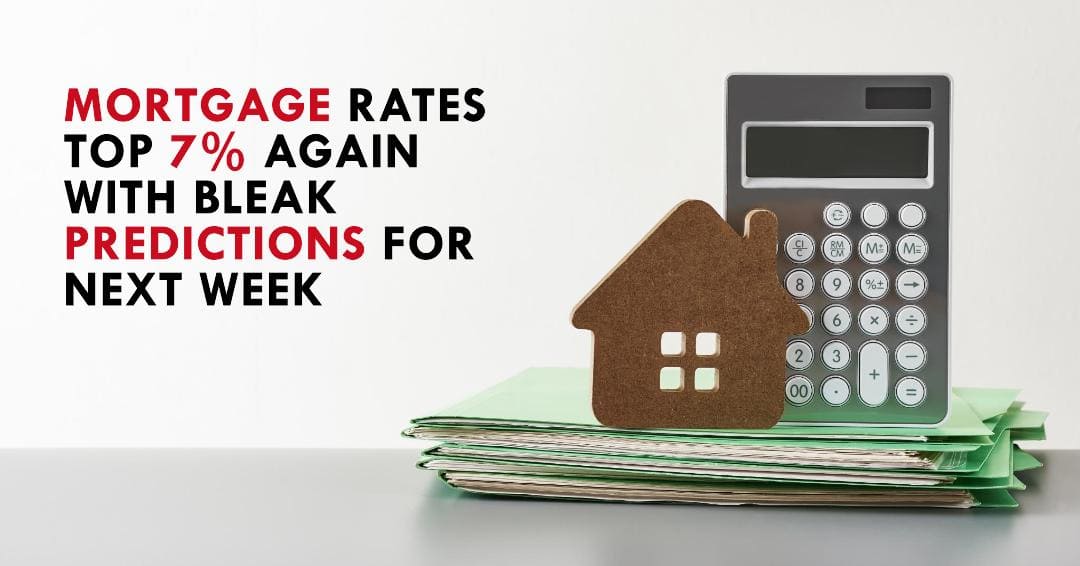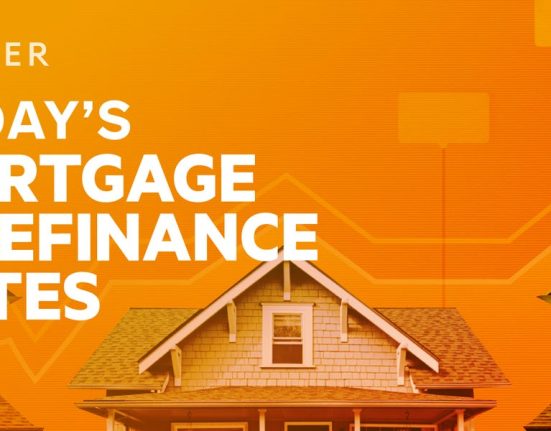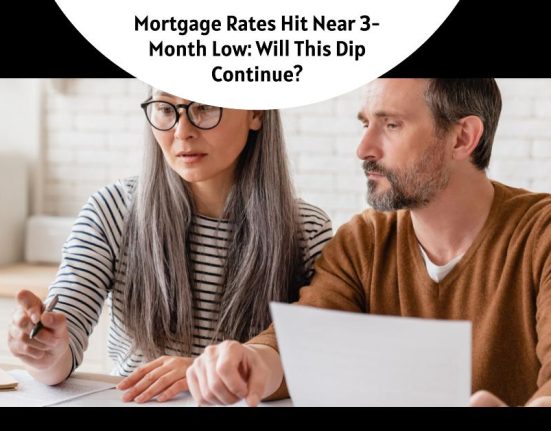Listen up, house hunters! If you’re dreaming of snagging your own slice of the American dream, you’ve got a new obstacle to hurdle. As of May 30th, 2024, the average 30-year fixed-rate mortgage (FRM) has jumped over the 7% mark for the first time in years. That’s right, after a short breather with lower rates, things are heating back up – and it’s not good news for housing affordability.
Mortgage Rates Top 7% Again: Bleak Predictions For Next Week
Let’s Break it Down
Here’s the skinny on the latest numbers:
– The average 30-year FRM is now at 7.03%, up from 6.94% just last week.
– Even the 15-year FRM isn’t immune, climbing to 6.36%.
These hikes come after a period of some stability, and they’re sure to shake things up for folks looking to buy a home or refinance an existing one.
Why the Rate Rollercoaster?
The Federal Reserve is the big player driving this whole mortgage rate game. They’re trying to tame inflation, a sneaky thief that steals spending power. To do that, they’re raising interest rates, which in turn affects what lenders charge for mortgages. So, the Fed taps the brakes on the economy, and mortgage rates shoot up.
Feeling the Squeeze
This rise in rates is a double whammy for the housing market:
– Buying Becomes a Stretch: With higher borrowing costs, homes become less affordable. This can sideline some buyers, especially first-timers who might be working with tighter budgets.
– Refinancing Rush Fizzles: When rates were at rock bottom, many homeowners refinanced to snag lower monthly payments. But with rates no longer a steal, the incentive to refinance dries up. This can slow down activity in the market.
The Home Buyer Hustle
If you’re still determined to land your dream home, here’s what you need to know:
Bigger Bites Out of Your Budget: Be prepared for a significant increase in your monthly mortgage payment. For example, let’s say you were looking to buy a $300,000 home with a 30-year fixed-rate mortgage at 6% interest. At that rate, your monthly payment would be around $1,815.
But with the current rate hovering around 7%, that same mortgage payment would jump to $2,008 – a difference of $193 per month. That might not seem like a lot, but over the course of a 30-year mortgage, it adds up to over $70,000 in additional interest. This is why it’s crucial to factor in higher mortgage rates when calculating how much home you can afford.
You might need to adjust your sights and consider a smaller house, a more affordable neighborhood, or a bigger down payment to offset the higher monthly costs. Let’s go back to our example.
If you could increase your down payment to 10% ($30,000), that would bring your loan amount down to $270,000. With a lower loan amount, your monthly payment at 7% interest would be around $1,890 – much closer to what you would have paid at the lower interest rate. So, saving up for a larger down payment can be a powerful tool to combat rising mortgage rates.


So, What to Expect for Mortgage Rates Next Week?
Experts are divided on what to expect for mortgage rates next week. Here’s a breakdown of the different predictions:
- Increase: A survey by Bankrate found that the majority of lenders they spoke to expect rates to rise next week. This aligns with the recent uptick after three weeks of decline.
- Hold Steady: Some experts believe rates will stay roughly around the current mark. This is because the recent rise might be a correction after a period of decline, and markets are still absorbing the latest economic data.
- Decrease: A smaller portion of experts predict a slight decrease in rates next week. This view is based on the hope that inflation might be cooling down, potentially leading the Fed to ease up on raising interest rates in the future, which could influence mortgage rates.
Overall, the forecast for next week’s mortgage rates is uncertain.
What’s Next for Mortgage Rates?
The housing market’s future is a bit of a guessing game. While rising rates are a challenge, other factors like the number of homes for sale also play a big role. Here’s what could impact the market:
The Fed’s Tightrope Walk:
The Federal Reserve is in a tricky spot. They need to raise interest rates enough to control inflation, but not so much that they trigger a recession. Their decisions will have a major influence on mortgage rates.
If the Fed raises rates aggressively, mortgage rates could climb even higher, further squeezing affordability and potentially slowing down the housing market.
On the other hand, if they ease up on raising rates too soon, inflation could heat back up, leading to another round of rate hikes down the road. The Fed’s actions will be closely watched by homebuyers, sellers, and everyone in between.
Inventory Levels: A Balancing Act:
The number of homes available for sale is another key factor that will affect the housing market. If more houses flood the market, it could ease the upward pressure on home prices, making them more attractive to buyers.
This could be a welcome sight for first-time homebuyers who have been struggling to compete with investors and cash buyers in a market with low inventory.
However, if the number of homes for sale remains low, it could create an environment where bidding wars erupt and home prices continue to rise. This could put homeownership further out of reach for many potential buyers.
The Overall Economic Climate:
The health of the broader economy is also important for the housing market. A strong economy with steady job growth can boost consumer confidence and encourage people to buy homes.
However, a weak economy with rising unemployment could lead to a decline in home sales and potentially even falling home prices. Keeping an eye on economic indicators like GDP growth, unemployment rates, and consumer confidence can help you gauge the overall health of the housing market.
The Bottom Line
Stay informed, folks! Keep an eye on mortgage rates and economic trends. Talk to a qualified mortgage professional. They can help you understand your options and craft a winning strategy in this ever-changing market. Remember, buying a home is a big decision, and having the right guide by your side can make all the difference.
ALSO READ:
Interest Rate Predictions for Next 2 Years: Expert Forecast
When is the Next Fed Meeting on Interest Rates in 2024?
Mortgage Rate Predictions for Next 5 Years
Mortgage Rate Predictions for the Next 2 Years
Mortgage Rate Predictions for Next 3 Years: Double Digit Rise







